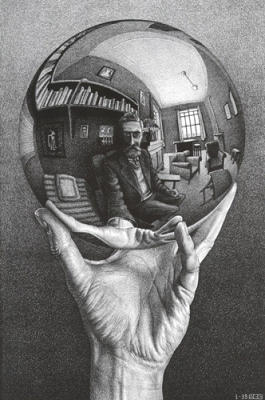 Illustration to the left, M.C Escher’s ‘Hand with Reflecting Sphere,’ or also, ‘Self-Portrait in Spherical Mirror‘ (found here), is an echo of some weird-ass shit in this framed in small-detail of the artwork, like the ceiling lamp in such an odd position:
Illustration to the left, M.C Escher’s ‘Hand with Reflecting Sphere,’ or also, ‘Self-Portrait in Spherical Mirror‘ (found here), is an echo of some weird-ass shit in this framed in small-detail of the artwork, like the ceiling lamp in such an odd position:
In the centre of the picture is Escher, looking straight at the viewer.
Behind him and alongside him is the studio in Rome, where the family resided at the time.
It is orderly and tidy.
The most intriguing feature of the work, however, is the hand holding the sphere: Escher’s right hand.
The hand is so close to the viewer that it appears as though the viewer is looking at his own hand.
In reality, do we actually see what we’re actually seeing? And why after a-short while, shit seems to lose its stench?
Entire emphasis in Escher’s piece is the ‘Hand,’ subject matter of the whole thing. And who’s hand is it anyway?
Not mine…
Over time, what reflection do we see? I can tell you, one aspect of getting old is history. A lot of shit I figured was one way 20 years ago, after reflection brought-on by age, a particular episode sometimes took opposite realities. In situations where I thought my actions had been ‘cool,’ may not have been all that ‘cool.’ Of course, hindsight…
Nowadays the grind is the reflection — interesting read at Engadget this morning about those ‘Comment Sections’ attached to some blogs, sites on the InterWeb, and how the comments have gotten way-way-negative, and dangerous, so bad some major venues have removed it.
And this little snip:
A recent study from the University of Texas at Austin found that incivility in the comments can have an outsized negative impact on the reader’s perception, not only of the article itself but the news outlet as a whole — AKA the Nasty Effect.
Specifically, researchers found that people who read stories with nothing but negative comments “had less-positive attitudes toward the site and saw it as less valuable” as well as “felt less loyal to the site and less similar to the commenters.”
What’s more, the order of the comments (whether you read a positive or negative one first) makes little difference, but there appears to be a saturation level of negativity that must be achieved.
“The argument used to be that it was anonymous comments [that caused problems] and people felt emboldened to say the worst things they possibly could because there were no repercussions,” Craig Newman, Chicago Sun-Times managing editor, told Digiday in 2014.
“Then, at some point in the last couple of years, a switch got flipped and anonymity was no longer a need when it came to spewing awfulness.
“It’s almost like there’s no shame anymore.”
Five years later, and the T-Rump.
Some supposedly new research indicates laughing at night about the horrors of the day has affect/effect — this study by Ethan Porter of George Washington University, and Thomas J. Wood of Ohio State University, and published online last week at ScienceDirect, reportedly shows viewer action/reaction — the Abstract:
To identify the effects of televised political comedy on the 2016 presidential election. election,
we leverage the change in hosts of two popular shows, The Daily Show and The Colbert Report, and both shows’ subsequent ratings declines.
By combining granular geographic ratings data with election results, we are able to isolate the shows’ effects on the election.
For The Daily Show, we find a strong positive effect on Jon Stewart’s departure and Trump’s vote share.
By our estimate, the transition at The Daily Show spurred a 1.1-percent increase in Trump’s county-level vote share.
Further analysis suggests that the effect may be owed more to Stewart’s effects on mobilization, not his effects on attitudes.
We also find weaker evidence indicating that the end of The Colbert Report was associated with a decline in 2016 voter turnout.
Our results make clear that late-night political comedy can have meaningful effects on presidential elections.
Interestingly weird…
Yet the reflection is still wrong. The US media still hasn’t figured out how to handle the T-Rump’s 24/7 lying — it’s not just misinformation, the asshole lies with every breath.
A Media Matters report from today:
Major media outlets failed to rebut President Donald Trump’s misinformation 65-percent of the time in their tweets about his false or misleading comments, according to a Media Matters review.
That means the outlets amplified Trump’s misinformation more than 400 times over the three-week period of the study — a rate of 19 per day.
The data shows that news outlets are still failing to grapple with a major problem that media critics highlighted during the Trump transition: When journalists apply their traditional method of crafting headlines, tweets, and other social media posts to Trump, they end up passively spreading misinformation by uncritically repeating his falsehoods.
And it’s getting worse…